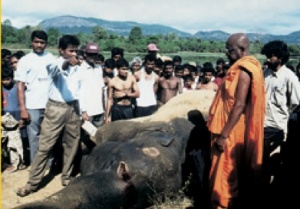If you follow the news and care about such things, then you know that the long-awaited circus trial has begun. In brief, Ringling Bros. circus must defend against charges that its use and (mis)treatment of exotic animals in its care violates the Endangered Species Act. Plaintiffs include the ASPCA, the Animal Welfare Institute, and the Fund for Animals. Among the acts alleged to violate the law include using of bullhooks to “train” elephants to perform stunts that have absolutely nothing to do with their typical behavior, chaining them continuously when they are not performing, depriving them of natural habitat and adequate exercise, and more. Some of the activities that the circus argues constitute necessary training or discipline seem just plain vicious. A verdict against the circus would be a huge legal victory, with significant changes in the way animals are used in travelling entertainment shows almost certain to follow. Read more about the trial and accompanying issues here, here, here and lots of other places as well.
I have not blogged extensively about the trial in part because it is so well-covered elsewhere. However, the issue of circus animal treatment has been around for a long time and it would be nice if the media’s gaze could expand to include some of the anti-cruelty efforts going on at the local and grass-roots levels. For example, last week, I met with the Committee to Ban Wild & Exotic Animal Acts – a group comprised of people in the Westchester community lobbying for legislation that would bar businesses using wild and exotic animals in their performances from county facilities. This group and others like it, both in Westchester and elsewhere, have had some significant legislative successes (including ordinances in the towns of Greenburgh, NY, Stamford CT, and Quincy, MA).
People working at the local level often face hostility and/or indifference from their friends and neighbors, and their work–even when successful–goes unheralded. That’s too bad. Like most institutionalized animal abuse, exotic animal acts are market-dependent. Without venues in which to perform, companies devoted to such endeavors cannot long survive. People like those in the Committee to Ban Wild and Exotic Animal Acts are working to starve the beast of animal exploitation. Regardless of the trial’s outcome, such groups deserve our attention and support.
—dnc
Update: Check out this article on two of the members of the Committee and their efforts on behalf of the circus animals.
Filed under: animal cruelty, animal ethics, animal law, animal welfare, circuses | Tagged: activism, animal abuse, animal advocacy, animal cruelty, animal ethics, animal rights, animal suffering, animal welfare, Animal Welfare Institute, ASPCA, bullhooks, circus, Endangered Species Act, exotic animals, Fund for Animals, Ringling Brothers | 3 Comments »
 Generally, people are using resources more rapidly than they can be regenerated. According to the Animal Welfare Institute the affects of overconsumption of resources by humans is currently having adverse effects across the world. Aside from the obvious consequences overpopulation creates for humans, there is a very real and dangerous affect for animals.
Generally, people are using resources more rapidly than they can be regenerated. According to the Animal Welfare Institute the affects of overconsumption of resources by humans is currently having adverse effects across the world. Aside from the obvious consequences overpopulation creates for humans, there is a very real and dangerous affect for animals.

